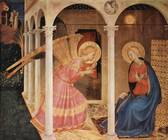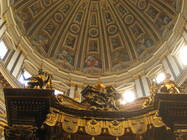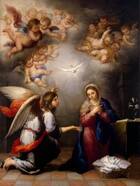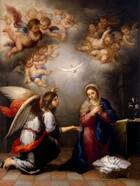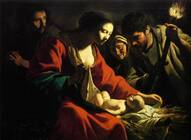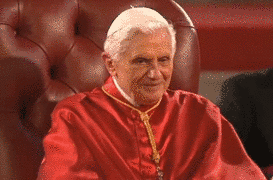
Papa Benedict XVI's Catecheses in the Year of Faith
given at his Wednesday Audiences
1) Introduction to the Year of Faith 
BXVI: "... Christians often do not even know the central core of their own Catholic faith, of the Creed, so leaving room for a certain syncretism and religious relativism, without clarity on the truths to be believed and on the salvific uniqueness of Christianity. Today the risk of building, so to speak, a “do-it-yourself” religion is not so far off. We must, instead, return to God, to the God of Jesus Christ, we must rediscover the message of the Gospel, bring it more profoundly into our consciences and our daily life.
In the catecheses of this Year of Faith I would like to offer help to take this path, to take up and deepen the central truths of faith about God, about man, about the Church, about the whole social and cosmic reality, by meditating and reflecting on the affirmations of the Creed. And I would like it to become clear that these contents or truths of faith (fides quae) are directly connected to our lives; they ask for a conversion of existence, which gives life to a new way of believing in God (fides qua). To know God, to encounter him, to explore the features of his face, is what brings our lives into play, because He enters into the profound dynamics of the human being.
May the path that we shall take this year make us all grow in faith and love of Christ, so that we may learn to live, in our choices and daily actions, the good and beautiful life of the Gospel. Thank you." (17.10.12)
2) What is faith? 
BXVI: "... Faith, then, is an assent with which our minds and our hearts say their “yes” to God, by confessing that Jesus is Lord. And this “yes” transforms life, opens the road towards a fullness of meaning, renders it thus new, rich in joy and trustworthy hope.
Dear friends, our time requires Christians who have been grasped by Christ, who grow in faith thanks to familiarity with Sacred Scripture and the Sacraments. People who are like an open book that narrates the experience of new life in the Spirit, the presence of that God who sustains us on our path and opens us to life that will have no end. Thank you." (24.10.12)
3) The Faith of the Church 
BXVI: " ..Lastly, I would like to emphasize that it is in the ecclesial community that personal faith grows and matures. It is interesting to observe how in the New Testament the word “saints” refers to Christians as a whole, and certainly not everyone would have had the qualities to be declared saints by the Church. What, then, is this term meant to indicate? The fact that those who had and lived faith in the risen Christ were called to become a point of reference for everyone else, putting them in contact with the Person and the Message of Jesus, who reveals the face of the living God. And this also holds true for us: a Christian who lets himself be guided and shaped gradually by the faith of the Church, despite his weaknesses, his limitations and his difficulties, becomes like a window open to the light of the living God, who receives this light and transmits it to the world. Blessed John Paul II in his Encyclical Redemptoris Missio affirmed that “Mission renews the Church, revitalizes faith and Christian identity, gives new enthusiasm and new motivation. Faith is strengthened when it is given to others”.
The widespread tendency today to relegate faith to the private sphere therefore contradicts its very nature. We need the Church so as to have our faith confirmed and so as to experience the gifts of God: his Word, the Sacraments, the support of grace and the witness of love. Thus our “I” in the “we” of the Church is able to perceive itself, at the same time, as the recipient and protagonist of an event that surpasses it: the experience of communion with God, which founds the communion among men. In a world in which individualism seems to regulate relationships between people, rendering them ever more fragile, faith calls us to be People of God, to be Church, bearers of the love and communion of God for all mankind (cf Gaudium et Spes, 1)." (31.10.12)
4) The Desire for God 
BXVI: "The pathway of reflection that we are making together in this Year of Faith leads us to meditate today on a fascinating aspect of human and Christian experience: man bears within himself a mysterious desire for God. In a very significant way, the Catechism of the Catholic Church opens precisely with this consideration: "The desire for God is written in the heart of man, because man is created by God and for God; and God does not cease to attract man towards Himself, and it is only in God that will man find the truth and happiness that he never ceases to seek" (n 27).
Such an affirmation, which still today in many cultural contexts appears totally easy to share, almost obvious, may instead seem a provocation in secularized Western culture. Many of our contemporaries could in fact object that they do not feel any such a desire for God. For large sectors of society, He is no longer the awaited one, the desired one, but rather a reality that leaves them indifferent, in front of whom one does not even need to make the effort to comment. In reality, what we have defined as "desire for God" has not entirely disappeared and presents itself still today, in many ways, in the heart of man. Human desire tends always to determined concrete goods, often far from spiritual, and nevertheless finds itself facing the question about what is truly "the" good, and thus is confronted with something that is other than itself, that man cannot construct, but is called to recognize. What can truly satisfy the desire of man?" (7.10.12)
5) Ways which lead to the knowledge of God 
BXVI: "Last Wednesday we reflected on the desire for God that the human being carries within the depths of himself. Today I would like to continue and deepen this aspect by briefly meditating with you upon some ways of arriving at the knowledge of God. I would like to remember, however, that the initiative of God always precedes every initiative of man and it is He first who illuminates us, orientates us and guides us also on the pathway towards Him, always respecting our freedom. And it is always He Himself who makes us enter into his intimacy, revealing to us and giving us the grace to be able to welcome this revelation in faith. Let us never forget the experience of St Augustine: it is not us who possess the Truth after having sought it, but it is the Truth that seeks us out and possesses us.
However, there are ways that can open up man's heart to the knowledge of God, there are signs that lead to God. Of course, we often risk being dazzled by the glitters of worldliness, which makes us less capable of walking such ways or of reading such/these signs. God, however, never tires of looking for us, He is faithful to man whom He has created and redeemed, He remains close to our lives, because He loves us. This is a certainty that must accompany us every day, even if a certain widespread mentality makes it more difficult for the Church and for the Christian to communicate the joy of the Gospel to every creature and to lead all to an encounter with Jesus, the only Saviour of the world. This, however, is our mission, it is the mission of the Church and every believer must live it joyfully, feeling it as their own, through an existence truly animated by faith, marked by charity, by service to God and to others, and capable of radiating hope. This mission shines above all in the holiness to which we are all called. .." (14.11.12)
6) The Reasonableness of Faith in God 
BXVI: "Today, in this catechesis, I would like to focus on the reasonableness of faith in God. Catholic tradition has from the very beginning rejected what is called fideism, which is the will to believe against reason. Credo quia absurdum (I believe because it is absurd) is not a formula that interprets the Catholic faith. Indeed, God is not absurd, rather He is mystery. Mystery, in turn, is not irrational, but the superabundance of meaning, of significance, of truth. If, looking at the mystery, reason sees darkness, it is not because in the mystery there is no light, but rather because there is too much of it. Just as when a man's eyes are turned directly towards the sun to look at it, they see only shadows; but who would say that the sun is not bright, on the contrary it is the source of light! Faith allows us to look at the "sun", God, because it is the welcoming of his revelation in history and, so to speak, it truly receives all the brightness of the mystery of God, in recognizing the great miracle: God has approached man and has offered himself to man's knowledge, acceding to the creaturely limits of man's reason. At the same time, God, through his grace, illuminates reason, opens to it new, immeasurable and infinite horizons. This is why faith constitutes a stimulus always to seek, never to stop and never to slacken in the inexhaustible discovery of truth and reality. The prejudice of certain modern thinkers, according to whom human reason would be blocked by the dogmas of faith, is false. It is exactly the opposite which is true, as the great masters of Catholic tradition have demonstrated. St Augustine, before his conversion, sought the truth with so much restlessness, through all the available philosophies, finding them all unsatisfactory. His strenuous rational search was for him a significant pedagogy in view of the encounter with the Truth of Christ. When he says, "Understand so as to believe and believe so as to understand", it is as if he were recounting his own experience of life. In front of divine Revelation, the intellect and faith are not strangers or antagonists but are both conditions for understanding the meaning, for receiving the authentic message, for approaching the threshold of the mystery. St Augustine, together with so many other Christian thinkers, is witness to a faith which is exercised with reason, which thinks and invites one to think .. " (21.11.12)
7) How to Speak of God? 
BXVI: "How to speak of God today? The first response is that we can speak of God, because He has spoken with us. The first condition for speaking of God is therefore to listen to what God himself has said. God has spoken with us! God is thus not a distant hypothesis about the origin of the world; He is not a mathematical intelligence very far away from us. God is interested in us, He loves us, He has entered personally into the reality of our history, He has communicated himself all the way to becoming incarnate. Thus, God is a reality of our lives, He is so great that He also has time for us, He cares for us. In Jesus of Nazareth we encounter the face of God, who came down from his Heaven so as to immerse Himself in the world of men, in our world, and teach the "art of living", the road of happiness; so as to liberate us from sin and render us children of God (cf Eph 1, 5; Rom 8, 14). Jesus came to save us and show us the good life of the Gospel. .." (28.11.12)
10) The Virgin Mary: Icon of Obedient Faith 
BXVI: ".. We find another hint of Mary's interior attitude in front of the action of God, again in the Gospel of St Luke, at the time of Jesus' birth, after the adoration of the shepherds. Luke affirms that Mary “kept all these things, meditating upon them in her heart” (Lk 2:19); in Greek the term is symballon, we could say that she “holds together”, “puts together” in her heart all the events that were happening; she placed each single element, each word, each fact within the whole and compared it, cherished it, recognizing that everything comes from the will of God. Mary does not stop at a first superficial understanding of what is happening in her life, but knows to look in depth, she lets herself be questioned by events, she digests them, discerns them, and acquires that understanding that only faith can guarantee. It is the profound humility of the obedient faith of Mary, who welcomes within her even what she does not understand in the action of God, leaving it to God to open her mind and her heart. “Blessed is she who believed in the fulfillment of the word of the Lord” (Lk 1:45), exclaims her kinswoman Elizabeth. It is precisely for her faith that all generations will call her blessed." (19.12.12)
11) He was Conceived by the Work of the Holy Spirit 
BXVI: ".. So let us return to the question with which we begun, the one about the origin of Jesus, synthesized by Pilate’s question: “Where are you from?” From our reflections it appears clear, right from the beginning of the Gospels, what the true origin of Jesus is: He is the Only-Begotten Son of the Father, He comes from God. We are before the great and disconcerting mystery which we celebrate in this time of Christmas: the Son of God, through the work of the Holy Spirit, was incarnate in the womb of the Virgin Mary. This is an announcement that rings out ever new and that in itself brings hope and joy to our hearts, because each time it gives us the certainty that, even though we often feel weak, poor, incapable in the face of the difficulties and evil of the world, the power of God acts always and works wonders in weakness itself. His grace is our strength (cf 2 Cor 12:9-10). Thank you." (2.01.13)
12) He was made man 
BXVI: "The Logos, who is with God, the Logos who is God, the Creator of the world (cf Jn 1, 1), for whom all things were created (cf Jn 1, 3), who has accompanied and accompanies men in their history with his light (cf Jn 1, 4-5; 1, 9), became one among others, took up his dwelling amongst us, becoming one of us (cf Jn 2, 14). The Second Vatican Ecumenical Council affirms: “The Son of God... worked with the hands of a man, he thought with the intelligence of a man, he acted with the will of a man, he loved with heart of a man. Born of the Virgin Mary, he truly became one of us, like us in all things except sin” (Constitution Gaudium et Spes, 22). It is thus important to rediscover amazement in front of this mystery, to let ourselves be enveloped by the greatness of this event: God, the true God, Creator of everything, as man has traveled our roads, entering into the time of man, so as to transmit to us his own life (cf 1 Jn 1, 1-4). And He did it not with the splendour of a sovereign, who subjugates the world with his power, but with the humility of a child." (9.01.13)
17) The Temptations of Jesus and Conversion to the Kingdom of Heaven 
BXVI: ".. In this time of Lent, in the Year of faith, we renew our commitment on the pathway of conversion, so as to overcome the tendency to close in on ourselves and to make, instead, space for God, looking with his eyes at daily reality. The alternative between the closing in of our egoism and the opening to the love of God and others, we could say corresponds to the alternatives of the temptations of Jesus: the alternative, that is, between human power and love of the Cross, between a redemption viewed solely on material well-being and a redemption as the work of God, to whom we give the primacy in existence. Conversion means not closing in on oneself in the search for one's own success, one's own prestige, one's own position, but making sure that every day, in the little things, truth, faith in God and love become the most important thing." (13.02.13)

